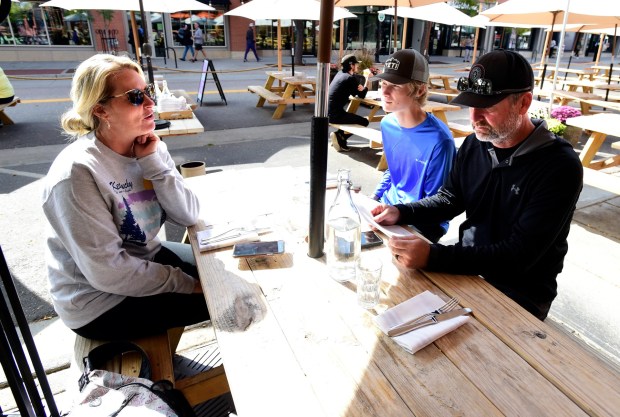With the official start of Boulder’s new outdoor dining program approaching, some members of the City Council are concerned about the program’s progress and the potential impact of any delays.
The pilot program, approved by the Council in June, offers expanded outdoor options for local businesses and serves as a more formal extension of the program the city created to support businesses at the beginning of the pandemic.
However, because none of the 31 restaurants interested in participating in the five-year program submitted complete applications by the Aug. 1 deadline, it’s likely that most, if not all, will experience a temporary gap in their ability to legally serve alcohol in the outdoor seating areas associated with the program, city staff shared in a Boulder City Council update Thursday.
Six of the 31 are able to proceed with the liquor licensing process. However, it can take up to a month or longer for the state to process such applications, so Boulder is expecting there will be timing constraints given the program is set to begin Sept. 1.
“They could continue to serve alcohol within their premises, just not in the outdoor dining area,” Deputy City Attorney Sandra Llanes said.
Liquor licensing is a dual process, whereby approved local licenses must then go to the state for approval. This process sped up during the height of the pandemic when statewide emergency orders allowed for concurrent processing, but the orders are no longer in place, city staff noted.
A number of councilmembers were concerned about the idea that the program could kick off without liquor licenses in place.
Councilmember Mark Wallach argued the outdoor program will “grind to … almost a complete halt” if it begins and businesses are not allowed to serve alcohol in the outdoor dining spaces.
Others agreed.
“Realistically, a lot of people are not going to go eat there if they can’t drink there,” Mayor Pro Tem Rachel Friend said.
Some asked whether the emergency orders, which end locally Aug. 31, could be extended. That isn’t a viable option, staff said, at least in part because Boulder County has moved into the Centers for Disease Control and Prevention’s lowest community coronavirus level.
“It is a public health order. It is not intended to support businesses,” City Manager Nuria Rivera-Vandermyde said.
Further, Colorado’s emergency orders that allowed concurrent processing ended in the spring.
While city officials acknowledged the impact on businesses participating in the program, they couldn’t find a solution that would avoid legal risk for the city. And, as some councilmembers noted, the program already has proven to be a lot of work for city staff members.
Though the liquor licensing element was discussed in the most detail Thursday, there was some conversation about the number of restaurants interested in participating.
“There seemed to be a fairly low level of participation in terms of the areas that are available versus the people who have applied,” Wallach said.
The outdoor dining pilot program will run through the end of October 2027.
It allows restaurants, brewpubs, taverns, wineries and distilleries that have available space within 150 feet of their entrances or directly in front of the building the business is located within to continue offering expanded outdoor dining by applying for the program and paying for a permit and parklet infrastructure from the city.
Boulder will subsidize some of that cost, though the amount depends on whether a business is using space in the public right of way or on private property and whether they have individually purchased infrastructure or are leasing it from the city.
According to information presented in Thursday’s meeting, applicants include Lucile’s Creole Café, Avanti Food and Beverage, T/Aco, Mountain Sun, The Kitchen and Mustard’s Last Stand.
The outdoor dining pilot program is an idea Boulder officials and community leaders have been exploring since last fall, more than a year after the city began its business recovery program to support businesses during the pandemic.
While the initial recovery program facilitated the closure of the west end of Pearl Street, that is not included in the more permanent program. The City Council will discuss the west end street closure in its Sept. 15 meeting.





